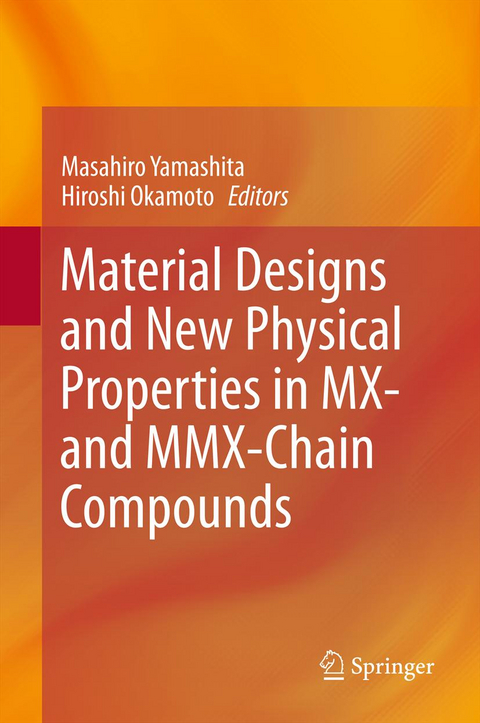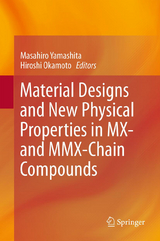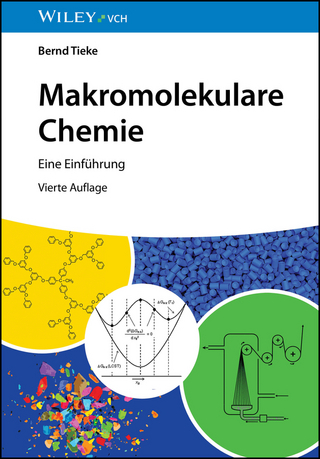Material Designs and New Physical Properties in MX- and MMX-Chain Compounds
This is the first book to comprehensively address the recent developments in both the experimental and theoretical aspects of quasi-one-dimensional halogen-bridged mono- (MX) and binuclear metal (MMX) chain complexes of Pt, Pd and Ni. These complexes have one-dimensional electronic structures, which cause the various physical properties as well as electronic structures. In most MX-chain complexes, the Pt and Pd units are in M(II)-M(IV) mixed valence or charge density wave (CDW) states due to electron-phonon interactions, and Ni compounds are in Ni(III) averaged valence or Mott-Hubbard states due to the on-site Coulomb repulsion. More recently, Pd(III) Mott-Hubbard (MH) states have been realized in the ground state by using the chemical pressure. Pt and Pd chain complexes undergo photo-induced phase transitions from CDW to MH or metal states, and Ni chain complexes undergo photo-induced phase transitions from MH to metal states. Ni chain complexes with strong electron correlations show tremendous third-order optical nonlinearity and nonlinear electrical conductivities. They can be explained theoretically by using the extended Peierls-Hubbard model. For MMX-chain complexes, averaged valence, CDW, charge polarization, and alternating charge polarization states have been realized by using chemical modification and external stimuli, such as temperature, photo-irradiation, pressure, and water vapor. All of the electronic structures and phase transitions can be explained theoretically.
1 General Intoruduction S. Takaishi and M. Yamashita.- 2 MX-Chain Compounds.- 2.1 Pt(II)-Pt(IV) and Pd(II)-Pd(IV) Mixed-Valence Compounds H. Matsuzaki and H. Okamoto.- 2.2 Ni(III) Mott-Hubbard Compounds S. Takaishi and M. Yamashita.- 2.3 Pd(III) Mott-Hubbard Compounds S. Takaishi and M. Yamashita.- 2.4 Photoinduced Phase Transitions in MX-Chain Compounds H. Matsuzaki and H. Okamoto.- 2.5 Nonlinear Electrical Conductivity, Current Oscillation and Its Control in Halogen-Bridged Nickel(III) Compounds H. Kishida and A. Nakamura.- 2.6 Gigantic Third-Order Optical Nonlinearity of Halogen-Bridged Nickel(III) Compounds H. Kishida and H. Okamoto.- 2.7 Theory of MX-Chain Compounds K. Iwano.- 3 MMX-Chain Compounds.- 3.1 Crystal Structures and Properties of MMX-Chain Compounds Based on Dithiocarboxylato-Bridged Dinuclear Complexes M. Mitsumi.- 3.2 POP-Type MMX-Chain Compounds with Binary Counter-Cations and Vapochromism H. Iguchi, S. Takaishi and M. Yamashita.- 3.3 Photoinduced Phase Transitions in MMX-Chain Compounds H. Matsuzaki and H. Okamoto.- 3.4 Theory of MMX-Chain Compounds K. Yonemitsu.
| Erscheint lt. Verlag | 14.12.2012 |
|---|---|
| Zusatzinfo | X, 270 p. |
| Verlagsort | Vienna |
| Sprache | englisch |
| Maße | 155 x 235 mm |
| Gewicht | 531 g |
| Themenwelt | Naturwissenschaften ► Chemie ► Organische Chemie |
| Schlagworte | Halogen bridged • Metallorganische Verbindungen • mixed valence • MMX compounds • MX compounds |
| ISBN-10 | 3-7091-1316-4 / 3709113164 |
| ISBN-13 | 978-3-7091-1316-5 / 9783709113165 |
| Zustand | Neuware |
| Informationen gemäß Produktsicherheitsverordnung (GPSR) | |
| Haben Sie eine Frage zum Produkt? |
aus dem Bereich




